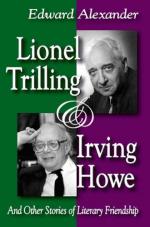|
This section contains 2,037 words (approx. 7 pages at 300 words per page) |

|
SOURCE: "On Irving Howe," in Partisan Review, Vol. LX, No. 3, 1993, pp. 343-47.
Radosh is an American educator and historian. In the following essay, he comments on the evolution of Howe's political views.
Irving Howe was one of our greatest intellects, a man of passion and intelligence who epitomized the now-lost world of the 1930s and 1940s "New York Intellectuals," a term he himself coined in a 1968 essay. He was by profession a literary critic, who wrote about Celine and Emerson, and of course, the world of the Yiddish community in which he grew up, and from which he brought the world's attention to a then-unknown Isaac Bashevis Singer. But Howe was also a student of culture who could not separate himself from the turmoil of his own world. As he once put it, the socialist movement was his school and his university. He grew up in its milieu...
|
This section contains 2,037 words (approx. 7 pages at 300 words per page) |

|


